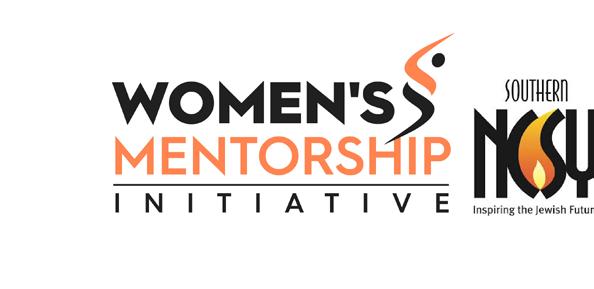WOMEN’S MENTORSHIP INITIATIVE GUIDEBOOK





Why another mentoring program– you might ask? Doesn’t NCSY have enough outreach and leadership programs? After all, NCSY offers leadership training through its Leadership Boot Camp, in its chapter and regional boards, and with JUMP (Jewish Unity Mentoring Program).
The uniqueness of the Women’s Mentorship Initiative is that it connects experienced women lay leaders to NCSY young leadership through its mentoring and leadership program. Not only will all participants benefit from their interaction, but they will also emerge from WMI with a stronger commitment to NCSY and the Jewish people.

NCSY has become a world-recognized organization that plays a pivotal role in the lives of Jewish teens across the globe. The goal of WMI is to focus on the role that NCSY plays as the largest provider of teen trips to Israel. Nearly 1,500 Jewish teens travel to Israel each summer. Statistics from numerous studies have proven that a trip to Israel can strengthen a teen’s Jewish identity and lifestyle choices.
Freda Greenbaum, who has a superlative track record is a role model committed to numerous Jewish causes, counts her involvement in Southern NCSY as “something special, where I can have an impact on young leaders just starting to blossom”
In 2016/2017 approximately 20 participants participated in the WMI pilot program. This year we anticipate that approximately 25 – 30 participants will reap the benefits of being matched with their mentor/ mentee, will discover what it means to be an effective mentor, and will learn about cultivating leadership skills to make them even more effective leaders.
NCSY has become an international organization that connects with Jewish teens through cutting-edge social and recreational programs to develop a positive Jewish identity; strengthen teen connection to Israel through informal Jewish education, retreats and summer programs; and empower teens through leadership development.
Background Information
WMI Objectives
WMI Mentoring Program Standards Program Description Time Frame Target Population Why Mentor? Why Become a Mentee? Service Learning Program Objectives
WMI Program Director – Lauren Bardos WMI Chair - Freda Greenbaum WMI Vice-Chair – Nicole Kavana WMI Vice-Chair – Jayne Shapiro
WMI Program Development Consultant – Mali Schwartz Associate Director of Education NCSY – Debbie Stone Professional Mentorship Coach- Ianna Raim Mentor/Mentee Training Mentor/Mentee Training Topics

The Jewish Journeys Time Line Exercise Reflecting on Your Time Line – For Mentors and Mentees Mentee Time Line Launch Event
Private Mentoring Sessions
The Five Mentor Approaches & Ten Skills For Mentors: A Self-Assessment Exercise – Where are you going? A Review of Mentor Values Mentor Coaching Questions For Mentees: A Self-Assessment Questionnaire Mentor’s Worksheet for Evaluating Mentee’s Goals Leadership Training Activities The Community Needs Game The Ride Along Field Trip A Look at the Diversity of Jewish Women Leaders Day of Reflection WMI Program Evaluation and Closure Conclusion Sources A Reading List
The goal of the Women’s Mentorship Initiative (WMI) is to cultivate a new generation of leaders, by offering mentor recruitment, matching mentors-mentees; providing training sessions, extending monitoring and support, and presenting leadership training. The training will include activities and exercises that focus on building skills and knowledge such as: networking; strengthening commitment to Israel; understanding community resources; learning about different styles of leadership; and what it means to be a Jewish woman leader today.

The Women’s Mentorship Initiative has integrated the six core standards from the Elements of Effective Practice for Mentoring, disseminated by MENTOR: The National Mentoring Partnership, the unifying champion for quality youth mentoring in the United States. “Elements” includes research-informed and practitionerapproved best practices for creating and sustaining impactful mentoring relationships and strong program services. The six core standards include the aspects of mentoring programs that directly support their mentoring relationships.
Recruit appropriate mentors and mentees by realistically describing the program’s aims and expected outcomes.
Screen prospective mentors to determine whether they have the time, commitment, and personal qualities to be an effective mentor and screen prospective mentees about whether they have the time, commitment, and desire to be effectively mentored.
Train prospective mentors and mentees in the basic knowledge, attitudes, and skills, needed to build an effective mentoring relationship.
Match mentors and mentees and initiate the mentoring relationship using strategies likely to increase the odds that mentoring relationships will endure and be effective.
Monitor mentoring relationship milestones, and support matches through providing ongoing advice, problem-solving, training, and access to resources for the duration of each relationship.
Facilitate bringing the match to closure in a way that affirms the contributions of the mentor and mentee, and offers them the opportunity to prepare for the closure and assess the experience.
WMI creates training opportunities to develop potential young leaders – it is a laboratory for future Jewish leadership. We incorporate recommended mentoring best practices by implementing the following objectives –specific, measurable, attainable, relevant, and time-bound, to provide a mentoring program that will boost leadership development, engagement, and the retention of potential new leaders.
Building relationships with NCSY funders can help emerging Jewish leaders understand the importance of fundraising and networking. By participating in WMI, mentors who are already involved with NCSY can reinforce their affiliation and can deepen role-identity as a volunteer. Mentors new to NCSY can learn what the outcomes are for potential young Jewish leaders who have a strong connection to Israel.
Zionism and support for Israel will be stressed as an essential factor in our program by sharing experiences of NCSY teens who have participated in trips to Israel, and by having mentors share what Israel means to them.
Our program balances the dueling needs of structure and flexibility. Structure is provided through ongoing participant training, progress tracking, and communication. Flexibility is incorporated through meeting participant needs for individual learning and growth. We realize that for many participants this will be their first experience in a mentoring program. Therefore, we ensure that their participation is worth their time and effort. We will also reach out to key leaders and stakeholders to educate them on the benefits and value of this program.
We are aware that increasingly, organizing and community-making take place online. This transformation is something that millennials, who constitute around 29% of the U.S. population, are part of and have “experienced a life changing, totally disruptive explosion of technology that gives them an entirely new way to be connected for change,” notes Pat Mitchell. One of WMI’s goals is to use technology to connect mentor-mentee pairs through preparatory learning exercises and as a way for them to provide feedback.
WMI is scheduled to take place during a seven-month period that is in alignment with the school calendar year, where mentors and mentees will meet regularly. WMI uses a mentoring-like relationship to deliver specific lessons and develop specific skills, by using a custom designed curriculum that will be offered on a regular basis.
WMI determines its target population of mentors and mentees by establishing the parameters and criteria for acceptance of our mentoring program. (see mentor-mentee profiles below). There are 12 - 15 mentor-mentee pairs (a total of between of 24 - 30 individuals) that will participate in the Women’s Mentoring Initiative. As more mentorsmentees participate in our leadership training annually, we envision that the outcome will be an increase in the number of potential new Jewish leaders on the horizon. We also foresee the development of additional regional cohorts in the future.
• Has participated in Jewish communal activities in a leadership capacity.
• Formal or informal involvement and/or familiarity with NCSY. (is open to learning about NCSY)
• A personal and/or family commitment of an annual $1,800 or more to the NCSY Summer Scholarship Campaign.
• A commitment to respect NCSY’s ideology / mission.
• Must participate in all WMI activities.
• Youth who have demonstrated leadership skills.
• Youth who are involved with NCSY (Chapter or Regional).
• An NCSY spokesperson.
• Must participate in all WMI activities.
To be a successful mentor, it takes an individual who is genuine about making a difference in the lives of others, someone who is committed to the process. It’s more than just a quick phone call. It’s an investment of quality time. Not quite a partnership, not strictly a friendship, the mentoring relationship – in any of its various forms –feeds the drive to succeed.
(Florida International University (FIU) Magazine Fall 2016)Research confirms that quality mentoring relationships have powerful positive effects on young people in a variety of personal, academic, and professional situations. Ultimately, mentoring connects a young person to personal growth and development, and social and economic opportunity.
Mentors also derive personal benefits from interacting with a young person such as: self-esteem and wellbeing; a sense of accomplishment; the creation of networks of volunteers; insight into adolescence and young adulthood; receiving professional development; increased patience and improved supervisory skills, and a better understanding of NCSY’s mission.
Young women are likely to have a positive understanding of female leadership possibilities if they are exposed to a variety of leadership styles modeled by women. Women are also more likely to see themselves as leaders if they are exposed to many examples of female leaders, both within the organization as well as external to it,” according to Ann Rorem, and Dr. Monisha Bajaj in an article on the harvard.edu website.
According to Marilyn Price-Mitchell, PhD, a developmental psychologist and researcher who conducted a study on the benefits of mentoring, “Regardless of income level, my study showed that teens grew intellectually, interpersonally, and emotionally from supportive mentors. For example, most reported they were better planners, organizers, and problem-solvers. And they grew in selfconfidence and self-awareness.”
By selecting NCSY teens who already participate in Jewish leadership positions to take part in the WMI leadership training program, WMI hopes that they will prove to be assets to the Jewish community at large. There has not been a lot of research conducted about leadership development and civic participation among youth – even less among young women. Yet we do know that having a mentor leads to positive youth development.
WMI incorporates the three-pronged approach of service learning, which many schools have integrated into their curriculum and include:
Preparation: which allows our participants to develop a sense of ownership of the project.
Action: which involves performing the activities and exercises planned.
Reflection: which provides the opportunity to consider the impact and meaning of participating in the Women’s Mentorship Initiative.
High schools will be contacted to ask if they will give community service credit to mentees for their participation in the Women’s Mentorship Initiative.
The supportive, healthy relationships formed between mentors and mentees are both immediate and longterm and contribute to a host of benefits for mentors and mentees.
• Create and empower a network of experienced female lay leaders to interact with NCSY high school teens who are currently involved in a leadership role.
• Promote teen leadership by offering a leadership program which will provide experiential learning opportunities, as well as connecting teens with mentors.
• Connect NCSY donors and prospects to NCSY teen leaders whose lives they touch, and strengthen donor’s commitment as volunteers and as funders, to raise scholarship monies to send NCSY teens to Israel.
• Provide the opportunity for teen leaders to network with local organizations, charities, and opportunities in their local Jewish communities.
• Train mentors and mentees about different styles of leadership, with a focus on the transformative style of leadership that women are more likely to use – a style that is based on mutual trust and collaboration.
Benefits for mentees:
Better attitude about school
Higher educational aspirations

Enhanced self-esteem and self-confidence
Stronger relationships with parents, teachers, and peers
Improved interpersonal skills
Will be more likely to assume leadership roles in the future
Benefits for mentors:
Increased self-esteem and well-being
A sense of accomplishment
Creation of networks of volunteers
Insight into adolescence and young adulthood
Receiving professional development
Increased patience and improved supervisory skills (U.S. Department of Labor)
A better understanding of NCSY’s mission

The Five Mentor Approaches was created by the Emergence International Co. to help empower emerging leaders. This guide for mentors helps to positively impact emerging leaders. Helping mentees to express their voice, learn new skills, and encourage practice. Growing as a mentor happens over time. Being aware of the mentor approaches and skills you have strength in, and those you may not be highly skilled in now, helps you to set goals to develop yourself.
builds trust and safety through sharing information, being accountable, acknowledging feelings and needs, and airing differences in a civil way.
Skill 3 – Listening Mentors communicate empathically to develop trust that fosters open communication and deeper understanding.
The five mentor approaches include a subset of ten skills which together form a vehicle through which mentors can grow. They include: which are at the heart of mentoring. Talking together about the purpose for the relationship and the roles each one helps mentors and mentees achieve clarity and shared expectation about their roles, needs, and boundaries. The mentor’s goals are consistency, genuineness, and honesty. Mentors and mentees are part of a larger community and help to model authentic relationships with other in the community.
Mentors need to know how to start relationships and maintain them over time.
Mentors need to link mentees to other leaders and people in the community who may be resources for mentees as well as promote the talents and successes of mentees in the community.

Skill 4 – Managing Conflict
Mentors know conflict is a part of relationships and are comfortable helping mentees have open conversations about differing points of view.
is a concept that promotes a two-way learning dynamic where both the mentor and the mentee are learning. The mentor takes the role of a coach and asks good questions to elicit reflection by the mentee and stimulate them to share their assumptions.
Skill 5
Mentors use coaching approaches to help learners formulate and clarify their own ideas and goals and articulate the steps to reach them.
Skill 6 –
Reflection is a powerful learning tool which help mentors and mentees to step back, evaluate, process, assess, and articulate learning from the experiences they are having and implications for next action.
Reviewing the following statements can help you become more aware of what area/s you need to improve to become a better mentor.
I affirm and support people’s feelings and ideas.
I resist the urge to take over.
I am careful about interrupting people of all ages.
I provide opportunities to reflect and learn.
I trust youth to be powerful.
I identify positive possibilities in difficult situations.
I listen carefully to people of all ages.
I seek to learn from other people.
I celebrate people’s successes.
I am an active listener and listen first and speak last.
I push just enough and encourage youth to pursue goals beyond what they may have imagined they could accomplish
I engage youth to understand all aspects of their lives and interests, value young people’s ideas and honor their changing feelings and moods.
I help youth foster self-decision making and help them believe they have the insights to make good choices.
I help youth put their challenges into perspective and help them see both sides of a situation,
Use the table below to create a three-point plan that will help you get to where you’d like to be with your mentoring skills. Identify and rank three areas of priority (areas of development) you would like to focus on, and create your own plan of action.

Instructions: Review the following items before framing an initial discussion about feedback with a mentee. They can also be used following a feedback interaction for checkpoints for review.
• Be specific and descriptive in asking for feedback.
• Make sure what you are asking for is clear and understandable.
• Stay focused.
• Avoid being defensive.
• See alternatives, not answers.
• Check for understanding.
• Make sure you are getting what you need.
• Ask for feedback on a regular basis.
Mentors who rephrase what they have heard clarify their own understanding and encourage the mentee to hear what they have articulated. This offers an opportunity for further clarification. Here are some examples of how to delve deeper to help coach your mentee more efficiently.
Problem:
1. What seemed to be the trouble? 2. What seemed to be the main obstacle? 3. What worried you most about _______________? 4. What do you consider the most troublesome part?
Description:
1. What was it like? 2. Tell me about it? 3. What happened?
Background:
1. What led you to _______________? 2. What else did you try before? 3. Will you fill me in on the background?
Example:
1. Can you give me an example? 2. For instance? 3. Like what? 4. Will you give me an illustration?
Extension: 1. Can you tell me more about it? 2. Anything else? 3. What other ideas did you have about it?
Appraisal: 1. How do you feel about that now? 2. How does it look to you now? 3. What did you make of it then? 4. What did you think is best then?
Exploration
1. Let’s explore that some more. 2. Are there any other angles you thought of? 3. What were your reactions to these things?
Involvement
1. What part did you play in this? 2. How involved were you in that then? Now? 3. How does this affect you today? 4. How did you fit into that picture?
On a scale of 1 to 5 please circle the number that most accurately reflects where you are at this point in time. 1=low, 2=average, 3=good, 4=very good., 5= excellent.
1. I am confident talking to people I don’t know
2. I have high expectations for myself and my future
3. I am good at articulating my ideas
4. I am confident in interviews.
5. I am self-disciplined
6. I need little support
7. I am self-motivated
8. I am quite ambitious
9. I can often solve problems alone
10. I find it easy working in groups
11. I am very good at organizing my own work
12. I have good time management skills
13. I have an idea of how I would like to pursue my community involvement in the future.
14. I know how to network to find people who can help me with my future goals.
15. I know the type of community involvement that I would like to focus on.
16. I have a firm idea of the type of career I would like to pursue in the future.
17. I am joining this program because I was persuaded
18. I think I could really benefit from a mentor
19. I will be very committed to working with my mentor
20. I have specific areas that I think my mentor could help me
1 2 3 4 5 1 2 3 4 5 1 2 3 4 5 1 2 3 4 5
1 2 3 4 5 1 2 3 4 5 1 2 3 4 5 1 2 3 4 5
1 2 3 4 5 1 2 3 4 5 1 2 3 4 5 1 2 3 4 5
1 2 3 4 5
1 2 3 4 5 1 2 3 4 5 1 2 3 4 5
1 2 3 4 5
1 2 3 4 5 1 2 3 4 5 1 2 3 4 5